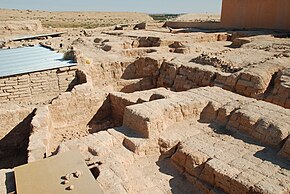Al-Mashrafah
| المشرفة (Arabic) | |

Part of the excavated royal palace
|
|
| Alternate name | Tell el-Mishrife |
|---|---|
| Location | Al-Mishirfeh, Homs Governorate, Syria |
| Region | Levant |
| Coordinates | 34°50′06″N 36°51′57″E / 34.83500°N 36.86583°ECoordinates: 34°50′06″N 36°51′57″E / 34.83500°N 36.86583°E |
| Type | Settlement |
| History | |
| Founded | Approximately mid 3rd millennium BC |
| Periods | Bronze Age |
| Cultures | Amorite |
| Site notes | |
| Excavation dates | 1924–1927 1929 1999–2011 |
| Condition | Ruined |
| Ownership | Public |
| Public access | Yes |
Qatna (Arabic قطنا, modern Tell el-Mishrife, Arabic المشرفة) is an archaeological site in the Wadi il-Aswad, a tributary of the Orontes, 18 km northeast of Homs, Syria. It consists in a tell occupying 1 km², which makes it one of the largest Bronze Age towns in western Syria. The tell is located at the edge of the limestone-plateau of the Syrian desert towards the fertile Homs-Bassin. The tell is named after the adjacent modern town of al-Mishirfeh.
The first finds at Qatna date to the mid- to late 3rd millennium BC, although this early period is not well represented.
The find of a 12th Dynasty Egyptian sphinx belonging to Princess Ita, daughter of Amenemhat II (1875–1840 BC) shows early Egyptian influence, although it is not clear at what time the sphinx got to Qatna (the sphinx was found within the debris of the Late Bronze Age palace).
The first king of Qatna (Qatanum) known by name from the Mari archives is Ishi-Adad ("Haddad" or "Adad is my help"), an Amurru or "Amorite". He was a confederate of Shamshi-Adad of Upper Mesopotamia. He was succeeded by his son Amut-pî-el who had been governor of Nazala as crown prince. This was in the time of Hammurabi of Babylon (1792–1750 BC). Beltum, the sister of Amut-pî-el was married to Jasmah-Addu of Mari. Contracts between Mari and Qatna define her as the principal wife of Jasmah-Addu. Her mother might have been Lammassi-Ashur from Assur or Ekallatum. Zimrilim of Mari was married to another princess from Qatna, Dam-hurasim. At its height, Qatna extended from Palmyra in the east, where it shared the borders with Mari, to Amurru in the west. After the destruction of Mari by Hammurabi, the written sources become sparse. Aleppo (Yamkhad) now became Qatna's most powerful neighbour, during the reign of Yarim-Lim III Qatna was temporarily dominated by Aleppo.
...
Wikipedia

